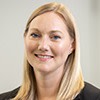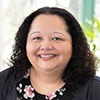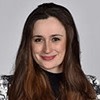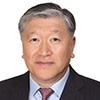What an executive MBA did for me

Roula Khalaf, Editor of the FT, selects her favourite stories in this weekly newsletter.
Eugenie Regan
Irish. Cambridge Judge Business School, UK, Executive MBA, graduated 2020. Vice-president of research solutions, Springer Nature, Cambridge
How do you use what you learnt on the course?
At the time, I was working for a non-governmental organisation and used the EMBA every day. My colleagues would laugh and say: “What has she learnt this weekend?” With marketing, for example, I thought, this is not going to be very useful or applicable because I work in the NGO sector. But marketing is all about end users and customers, whereas my sector is all about the science and research, as opposed to asking who the end user is and how can we orient around them? So immediately I was able to apply that expertise.
I also learnt about finance. I was able to read all the financial information and make informed decisions and have conversations with the finance people. I also have confidence in it, as opposed to thinking, “I do not understand that — this must be a really stupid question” or “that looks funny but I must have it wrong”. Instead I can say that looks funny, it is wrong, and have an intelligent conversation.

Natasha Müller
British/German. Iese Business School, Executive MBA, graduated 2021. Marketing manager, Microsoft Germany
What survival tips do you have for doing an EMBA?
For me it was a team effort with my husband, my children, my work and Iese recognising that there were going to be challenges along the way. A lot happens in people’s lives over two years and you have to find a way to navigate it.
FT Executive MBA ranking 2021 — top 100

Find out which schools are in our ranking of EMBA degrees. Learn how the table was compiled.
Other survival tips would be to take the EMBA seriously, but not too seriously. Yes, it is a great opportunity to learn, but it is not a life-or-death situation. If you cannot hand in that assignment, then sometimes you have to say, “I am sorry I cannot do it.”
I learnt to prioritise very strictly and to start saying no to some things. I only missed one assignment and I did not like doing it, but I was pushed to my absolute limits and knew that I could have stayed up all night doing it but would have had no learning benefit from it. I would not have had the confidence to do that at the beginning of the course, but one of the big lessons from the EMBA is how to prioritise and say no.

Iris Depaz
Australian. IMD Business School, Switzerland, Executive MBA, graduated 2020. Country medical lead, Sanofi Australia and New Zealand
Why did you decide to do an EMBA?
It changed. The original reason was that I come from a technical background — I have a PhD and have worked in the pharmaceutical and vaccines industry for a long time. But to move into more commercial or strategic parts of the business, an EMBA would help me be competitive internally. I postponed it for a while but became aware that people who had studied the EMBA knew things I did not.
What tipped me over the edge was the offering from IMD and the opportunity to apply what we were learning in class directly to the business. My boss and I agreed 20 per cent of my performance indicators for the year could be on projects aligned with my EMBA. So I was working with marketing, finance and other teams for my coursework. When I learnt this was a possibility I said, OK, I am going to do this, because I could see there was going to be some immediate benefit to me and to the business.

Georgia Steele-Matthews
British. Bayes Business School, City University of London, Executive MBA, graduated 2021. Account partner director, Salesforce, London
How has the course changed your career?
The EMBA has given me a fantastic stepping stone into the corporate world. The way it set me apart from other candidates was second to none.
When I applied for my previous role at Dell Technologies, the fact I was undertaking an EMBA meant I was taken seriously. With my background in start-ups and scale-ups, some people can see you as a risk because you are different. Then moving into Salesforce, having that EMBA, completing it, getting a distinction also then helps you have more gravitas because people know that you understand business — because you have done the EMBA.
It brings gravitas and de-risks you as a hire because they know that you have gone through the rigmarole and you understand the basic principles of each aspect of a business.

Jin Hyoung Kang
South Korean. Korea University Business School, Executive MBA, graduated 2018. Medical oncologist, Seoul St Mary’s Hospital, Republic of Korea
What was the biggest lesson you learnt on the course?
I experienced many different subjects during the two years on the EMBA.
Behavioural science, however, was the most important and the most impressive. When I was at medical school, I was very interested in psychiatry and how people think differently about the same things. Behavioural science is very close to psychiatry and psychology in medicine, so that is why I was interested at first. But behavioural science is also very important for managing colleagues because anything you do in a company relies on how you work with people.
Topics such as supply chains and marketing are essential, but the most important thing is how to handle human resources efficiently. Machines and systems are one thing, but you need mankind to operate them.
Comments